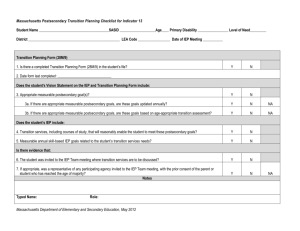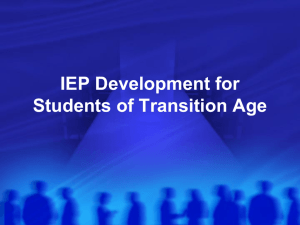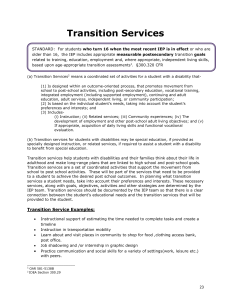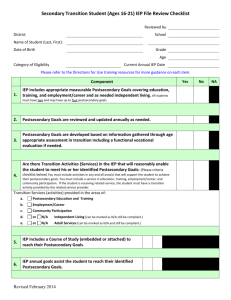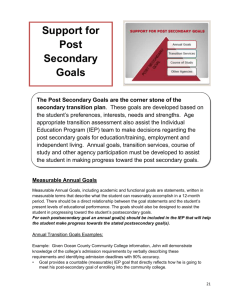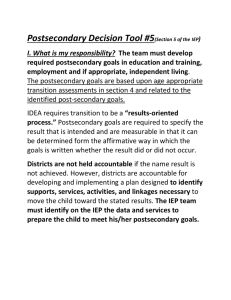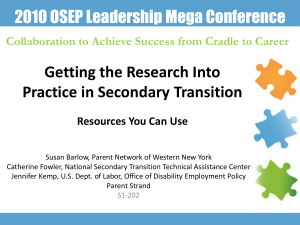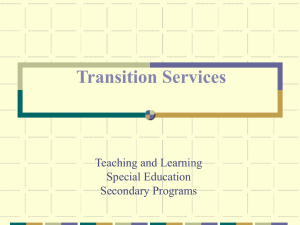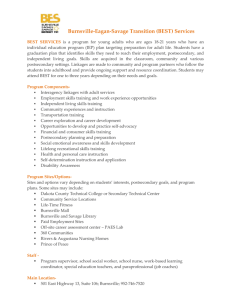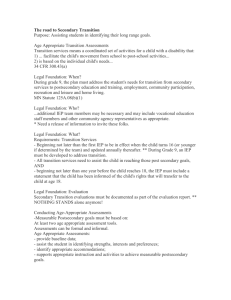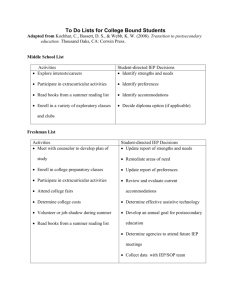1 Transition in the IEP
advertisement
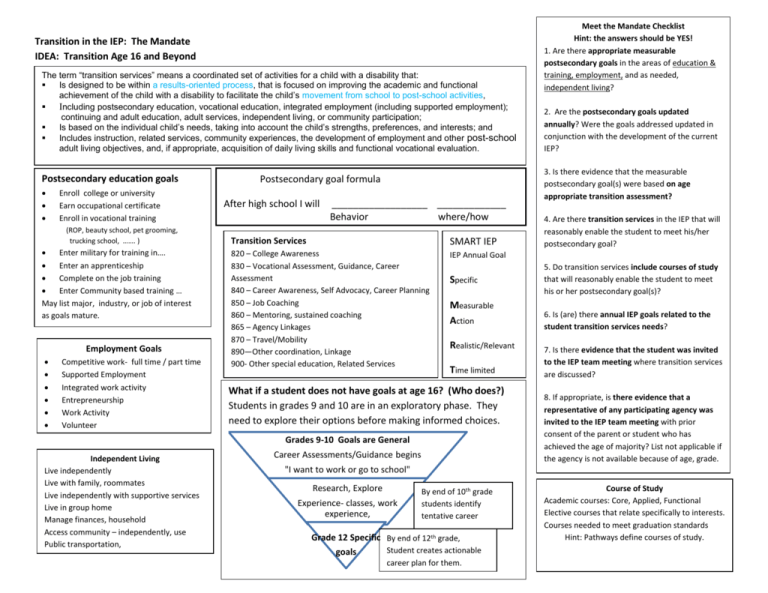
Transition in the IEP: The Mandate IDEA: Transition Age 16 and Beyond The term “transition services” means a coordinated set of activities for a child with a disability that: Is designed to be within a results-oriented process, that is focused on improving the academic and functional achievement of the child with a disability to facilitate the child’s movement from school to post-school activities, ncluding postsecondary education, vocational education, integrated employment (including supported employment); continuing and adult education, adult services, independent living, or community participation; Is based on the individual child’s needs, taking into account the child’s strengths, preferences, and interests; and Includes instruction, related services, community experiences, the development of employment and other post-school adult living objectives, and, if appropriate, acquisition of daily living skills and functional vocational evaluation. Postsecondary education goals Enroll college or university Earn occupational certificate Enroll in vocational training (ROP, beauty school, pet grooming, trucking school, ……. ) Enter military for training in…. Enter an apprenticeship Complete on the job training Enter Community based training … May list major, industry, or job of interest as goals mature. Employment Goals Competitive work- full time / part time Supported Employment Integrated work activity Entrepreneurship Work Activity Volunteer Postsecondary goal formula After high school I will __________________ _____________ Behavior where/how Transition Services SMART IEP 820 – College Awareness 830 – Vocational Assessment, Guidance, Career Assessment 840 – Career Awareness, Self Advocacy, Career Planning 850 – Job Coaching 860 – Mentoring, sustained coaching 865 – Agency Linkages 870 – Travel/Mobility 890—Other coordination, Linkage 900- Other special education, Related Services IEP Annual Goal Specific Measurable Action Realistic/Relevant Time limited What if a student does not have goals at age 16? (Who does?) Students in grades 9 and 10 are in an exploratory phase. They need to explore their options before making informed choices. Grades 9-10 Goals are General Independent Living Live independently Live with family, roommates Live independently with supportive services Live in group home Manage finances, household Access community – independently, use Public transportation, Career Assessments/Guidance begins Meet the Mandate Checklist Hint: the answers should be YES! 1. Are there appropriate measurable postsecondary goals in the areas of education & training, employment, and as needed, independent living? 2. Are the postsecondary goals updated annually? Were the goals addressed updated in conjunction with the development of the current IEP? 3. Is there evidence that the measurable postsecondary goal(s) were based on age appropriate transition assessment? 4. Are there transition services in the IEP that will reasonably enable the student to meet his/her postsecondary goal? 5. Do transition services include courses of study that will reasonably enable the student to meet his or her postsecondary goal(s)? 6. Is (are) there annual IEP goals related to the student transition services needs? 7. Is there evidence that the student was invited to the IEP team meeting where transition services are discussed? 8. If appropriate, is there evidence that a representative of any participating agency was invited to the IEP team meeting with prior consent of the parent or student who has achieved the age of majority? List not applicable if the agency is not available because of age, grade. "I want to work or go to school" Research, Explore By end of 10th grade Experience- classes, work students identify experience, tentative career interests Grade 12 Specific By end of 12th grade, Student creates actionable goals career plan for them. Course of Study Academic courses: Core, Applied, Functional Elective courses that relate specifically to interests. Courses needed to meet graduation standards Hint: Pathways define courses of study. Standards Based IEP Development Postsecondary Goals Education Employment, Independent living Annual Goals - lead to attainment of postsecondary goals Student Interests, Readiness, Challenges Do you agree? What are the implications for career planning and transition? Course of Study Core Academic Standards Industry Standards Core Academic Standards Applied Academic Standards Life Skills Standards/Curriculum Time in Special Education Severe Moderate Mild Quality Transition Requires Time Disability In his book, Getting Real: Helping Teens Find Their Future, Kenneth Gray suggests that there are three predictors of postsecondary education success: Academic Skills Career Focus Maturity, including career maturity Goals HS Diploma HS Diploma or Certificate Certificate The Time Factor: Many students and teachers who focus on preparing for graduation and earning a high school diploma struggle to address transition because of the limited time available. Students who are self directed can be encouraged to take webbased career assessments (surveys, self appraisals, and interest surveys. These need to be followed up with reflection and transition interviews to document goals. Some schools utilize computerized information systems. Others rely on public, free systems. Again, reflection is critical. There is an array of career resources at www.californiacareers.info.
